高二英语必修五 module3 adventure in literature and the cinema教案
- 格式:doc
- 大小:267.50 KB
- 文档页数:16
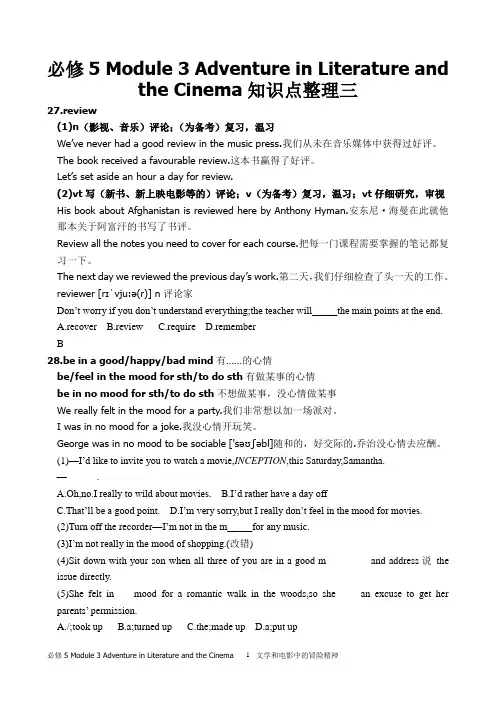
必修5 Module 3 Adventure in Literature and the Cinema知识点整理三27.review(1)n(影视、音乐)评论;(为备考)复习,温习We’ve never had a good review in the music press.我们从未在音乐媒体中获得过好评。
The book received a favourable review.这本书赢得了好评。
Let’s set aside an hour a day for review.(2)vt写(新书、新上映电影等的)评论;v(为备考)复习,温习;vt仔细研究,审视His book about Afghanistan is reviewed here by Anthony Hyman.安东尼·海曼在此就他那本关于阿富汗的书写了书评。
Review all the notes you need to cover for each course.把每一门课程需要掌握的笔记都复习一下。
The next day we reviewed the previous day’s work.第二天,我们仔细检查了头一天的工作。
reviewer [rɪˈvju:ə(r)] n评论家Don’t worry if you don’t understand everything;the teacher will_____the main points at the end.A.recoverB.reviewC.requireD.rememberB28.be in a good/happy/bad mind有……的心情be/feel in the mood for sth/to do sth有做某事的心情be in no mood for sth/to do sth不想做某事,没心情做某事We really felt in the mood for a party.我们非常想以加一场派对。
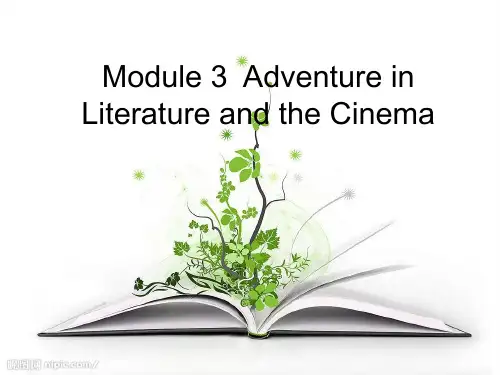

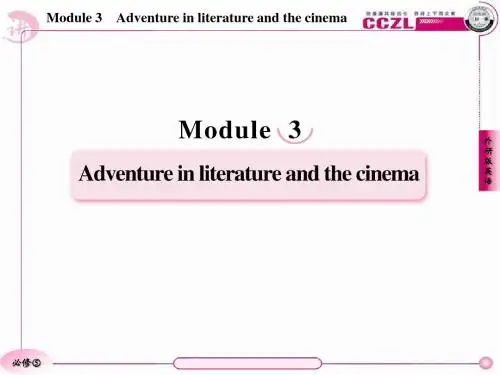
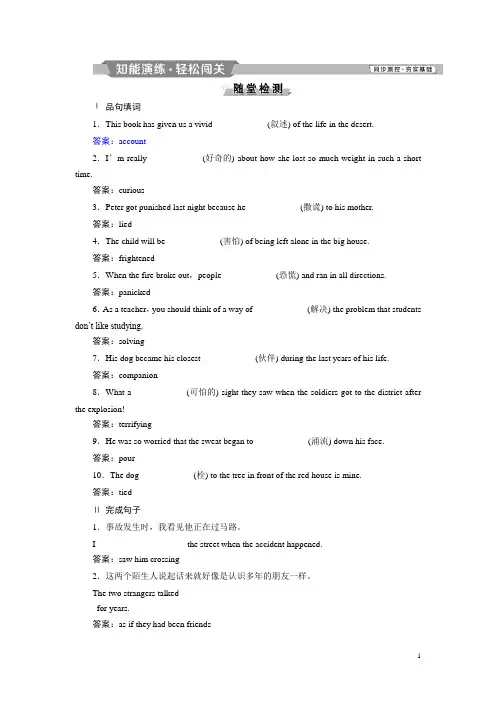
Ⅰ品句填词1.This book has given us a vivid ____________(叙述) of the life in the desert.答案:account2.I’m really ____________(好奇的) about how she lost so much weight in such a short time.答案:curious3.Peter got punished last night because he ____________(撒谎) to his mother.答案:lied4.The child will be ____________(害怕) of being left alone in the big house.答案:frightened5.When the fire broke out,people ____________(恐慌) and ran in all directions.答案:panicked6.As a teacher,you should think of a way of ____________(解决) the problem that students don’t like studying.答案:solving7.His dog became his closest ____________(伙伴) during the last years of his life.答案:companion8.What a ____________(可怕的) sight they saw when the soldiers got to the district after the explosion!答案:terrifying9.He was so worried that the sweat began to ____________(涌流) down his face.答案:pour10.The dog ____________(栓) to the tree in front of the red house is mine.答案:tiedⅡ完成句子1.事故发生时,我看见他正在过马路。
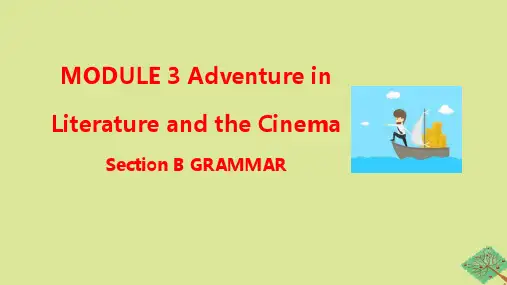
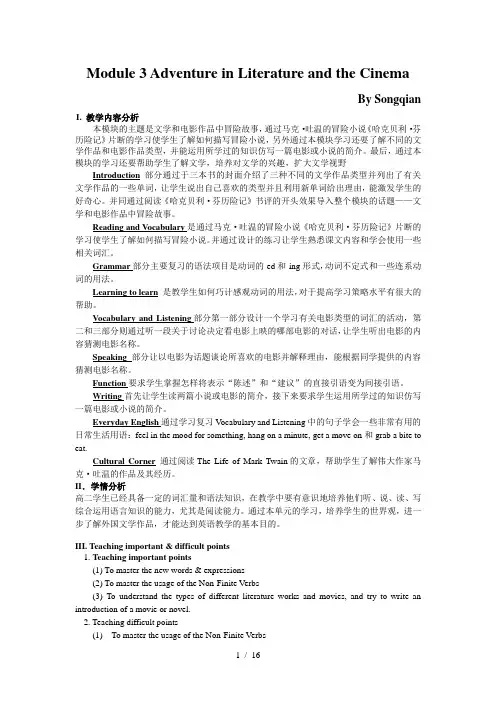
Module 3 Adventure in Literature and the CinemaBy Songqian I. 教学内容分析本模块的主题是文学和电影作品中冒险故事,通过马克·吐温的冒险小说《哈克贝利·芬历险记》片断的学习使学生了解如何描写冒险小说,另外通过本模块学习还要了解不同的文学作品和电影作品类型,并能运用所学过的知识仿写一篇电影或小说的简介。
最后,通过本模块的学习还要帮助学生了解文学,培养对文学的兴趣,扩大文学视野Introduction 部分通过于三本书的封面介绍了三种不同的文学作品类型并列出了有关文学作品的一些单词,让学生说出自己喜欢的类型并且利用新单词给出理由,能激发学生的好奇心。
并同通过阅读《哈克贝利·芬历险记》书评的开头效果导入整个模块的话题——文学和电影作品中冒险故事。
Reading and Vocabulary是通过马克·吐温的冒险小说《哈克贝利·芬历险记》片断的学习使学生了解如何描写冒险小说。
并通过设计的练习让学生熟悉课文内容和学会使用一些相关词汇。
Grammar部分主要复习的语法项目是动词的-ed和-ing形式,动词不定式和一些连系动词的用法。
Learning to learn是教学生如何巧计感观动词的用法,对于提高学习策略水平有很大的帮助。
Vocabulary and Listening部分第一部分设计一个学习有关电影类型的词汇的活动,第二和三部分则通过听一段关于讨论决定看电影上映的哪部电影的对话,让学生听出电影的内容猜测电影名称。
Speaking部分让以电影为话题谈论所喜欢的电影并解释理由,能根据同学提供的内容猜测电影名称。
Function要求学生掌握怎样将表示“陈述”和“建议”的直接引语变为间接引语。
Writing首先让学生读两篇小说或电影的简介,接下来要求学生运用所学过的知识仿写一篇电影或小说的简介。
Everyday English通过学习复习Vocabulary and Listening中的句子学会一些非常有用的日常生活用语:feel in the mood for something, hang on a minute, get a move on和grab a bite to eat.Cultural Corner 通过阅读The Life of Mark Twain的文章,帮助学生了解伟大作家马克·吐温的作品及其经历。
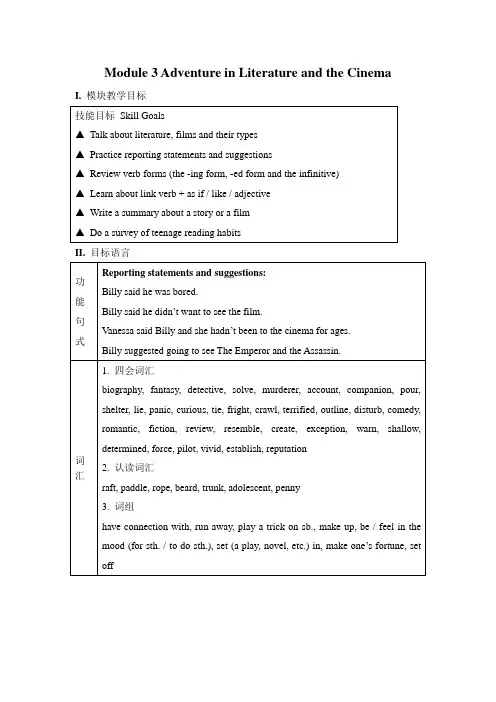
Module 3 Adventure in Literature and the Cinema I. 模块教学目标II. 目标语言Ⅲ. 教材分析与教材重组1. 教材分析本模块以文学作品及电影为话题,通过学生对所接触过的中外文学作品及电影的讨论,使其更加了解中外文学作品和电影以及它们的种类。
通过对马克·吐温的冒险小说《哈克贝利·费恩历险记》片段的学习,使学生了解如何描写冒险小说,并能运用所学的有关文学及电影的写作知识写一篇自己所读过的小说或看过的电影的简介。
1.1 INTRODUCTION为全模块的热身部分,首先列出了三本不同类型的文学作品,让学生说出自己所喜欢的一本并说明理由。
接着列出了有关各种文学作品种类的词汇,同时设计了三个练习活动,学生可以初步熟悉这些词的意义,并且学会判断不同类型的文学作品,为以后的各项学习活动做好准备。
1.2 READING AND VOCABULARY的课文部分摘选了《哈克贝利·费恩历险记》的一个片段,叙述Huck 和Jim在密西西比河的冒险途中所发生的一个故事。
围绕着课文,编者设计了四个与课文内容和词汇有关的练习。
通过这些练习,学生可以熟悉课文内容,学会使用描写人物细节动作的一些词汇。
1.3 GRAMMAR部分首先围绕“动词的-ing形式,-ed形式和to do形式”,通过五个练习,使学生掌握它们的用法。
接着通过四个语法练习让学生掌握系动词后面跟as if, like或形容词表示感官上的猜测。
1.4 VOCABULARY AND LISTENING部分让学生通过听一段对话,了解其中对几部电影的简单描述并完成相关练习。
1.5 SPEAKING部分通过两个活动,练习口头描述自己所喜爱的电影并说出喜爱的原因。
1.6 FUNCTION部分列出了陈述观点及表达建议的语句,要求学生完成将直接引语变为间接引语的练习。
1.7 WRITING部分让学生读两个小说缩写, 然后做几个选择题来总结缩写的写作要点,并让学生通过讨论练习对一部电影进行缩写。
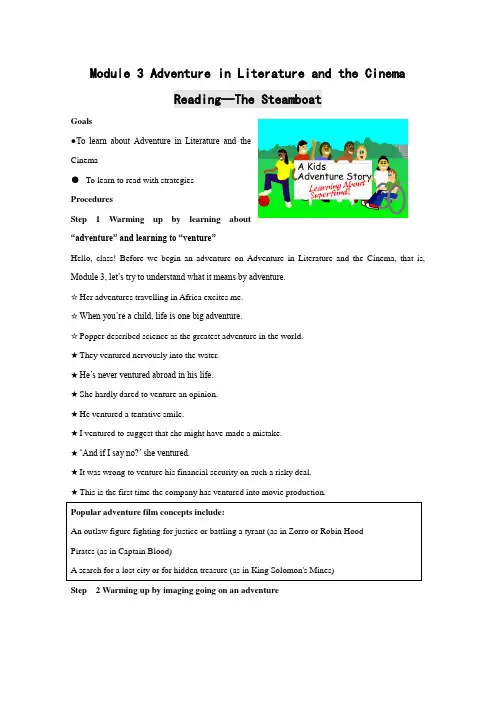
Module 3 Adventure in Literature and the CinemaReading—The SteamboatGoals●To learn about Adventure in Literature and theCinema●To learn to read with strategiesProceduresStep 1 Warming up by learning about“adventure” and learning to “venture”Hello, class! Before we begin an adventure on Adventure in Literature and the Cinema, that is, Module 3, let’s try to understand what it means by adventure.☆Her adventures travelling in Africa excites me.☆When you’re a child, life is one big adventure.☆Popper described science as the greatest adventure in the world.★They ventured nervously into the water.★He’s never ventured abroad in his life.★She hardly dared to venture an opinion.★He ventured a tentative smile.★I ventured to suggest that she might have made a mistake.★‘And if I say no?’ she ventured.★It was wrong to venture his financial security on such a risky deal.★This is the first time the company has ventured into movie production.Popular adventure film concepts include:An outlaw figure fighting for justice or battling a tyrant (as in Zorro or Robin HoodPirates (as in Captain Blood)A search for a lost city or for hidden treasure (as in King Solomon's Mines)Step 2 Warming up by imaging going on an adventureBoys and girls, what is adventure?Adventure is an exciting trip. If you are bored, you couldimagine going on a great adventure.Have a go at caving, climbing, sailing and canoeing atAdventure Club during the summer vocation.All the activities at Adventure Club are run and supervised byqualified and experienced staffAdventure Club started life in the 1970s as a sailing club foryoung people. Since this time it has grown and grown.Adventure Club now provides over 10,000 sessions of adventure to young people each year.Would you like to go? Then come with me!Step 3 Before you readPlease go over the word list for this module, paying attention to the pronunciation of the word, the relationship between its pronunciation and its spelling.Step 4 While you readCut/ the sentences into thought groups, blacken the predicates, underline the useful expressions and darken the connectives.Step 5 After you readCopy all the useful expressions into your Expression Book and make your own sentences with them.a big storm/ after midnight/ pour down, stay inside the shelter, sail down…, by the light of the lightning, in the middle of …, look like…, at first,hit a rock, half in and half out of …, sail straight towards…, go under, after a couple of minutes, take a look, board a sinki ng ship, find something useful, on the boat, paddle over, climb on to the steamboat, keep as quiet as mice, to our astonishment, a light in one of the cabins, a man's angry voice, last time, run to the raft, feel very curious, put…round the door, quite dark, lie on the floor, be tied up with rope, stand over…, him, with a beard, have…in one’s hand, look like…, have enough of…, on the floor, leave…here, in a couple of hours, go down with…, the frightened man, on the floor, die of fright, find a way to save …, crawl along…, take… away, look terrified, persuade…to help…, be tired to…, climb quietly in, paddle away, by then, a safe distance away, feel bad about…Step 6 Read to transfer informationYou are to read the text once again to complete the table with necessary information from it.Clues in the story of The SteamboatParagraph 1 A steamboat had hit a rock and was half in and half out of the water. We were sailing straight towards it.Paragraph 2 “It looks as if it'll go under soon,” Jim said, after a c ouple of minutes. Paragraph 3 “Let's go and take a look,” I said.Paragraph 4 Climbing on to the steamboat, we heard someone shout,"Oh please boys, don't kill me!I won't tell anybody!”Paragraph 5 A man's angry voice answered, “You're lying. You said th at last time. We're going to kill you”.Paragraph 6 I could see two men standing over a man lying on the floor, tied up with rope. Paragraph 7 “I'm going to shoot you now," the taller one with a gun in his hand said. Paragraph 8 "No, don't do that," said the shorter one. "Let's leave him here. The steamboat will sink in a couple of hours and he'll go down with it.”Paragraph 9 l thought. “I have to find a way to save him!”Paragraph 10 "We must find their boat and take it away, then they'll have to stay here," I said to Jim.Paragraph 11 And then we found the men’s boat tired to the other side of the steamboat.Step 7 Closing down by learning about steamboatsA steamboat or steamship, sometimes called a steamer, is a boat or vessel that is propelled by steam power driving a propeller or paddlewheel. Theterm steamboat is usually used to refer to smallersteam-powered boats working on lakes and rivers,particularly riverboats in the USA; steamshipgenerally refers to steam powered ships capable ofcarrying a (ship's) boat. Nuclear powered ships andsubmarines use steam to drive turbines, but are notreferred to as steamships or steamboats.Screw-driven steamships generally carry the ship prefix "SS" before their names, or "TS" where powered by a steam turbine. Paddle steamers have the prefix "PS". The term steamer is occasionally used, out of nostalgia, for diesel motor driven vessels, prefix "MV".。
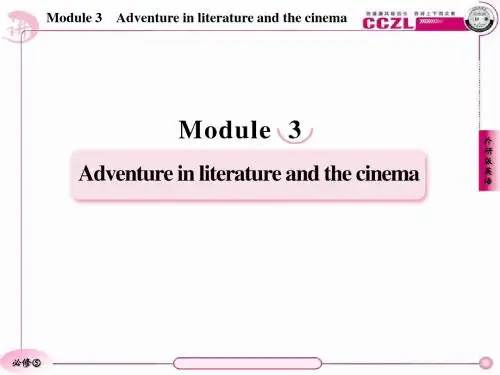
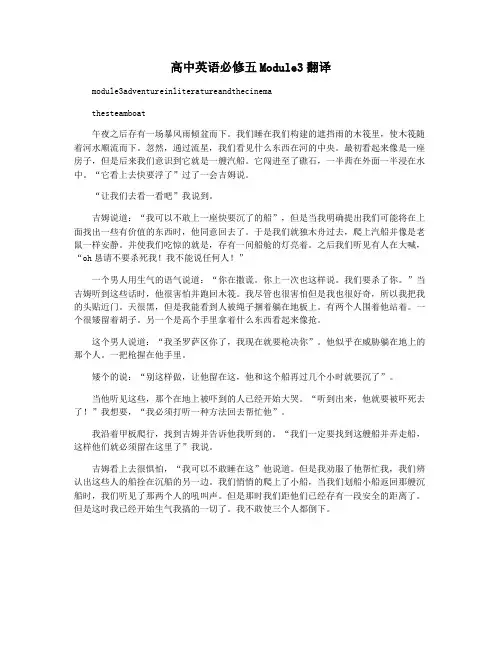
高中英语必修五Module3翻译module3adventureinliteratureandthecinemathesteamboat午夜之后存有一场暴风雨倾盆而下。
我们睡在我们构建的遮挡雨的木筏里,使木筏随着河水顺流而下。
忽然,通过流星,我们看见什么东西在河的中央。
最初看起来像是一座房子,但是后来我们意识到它就是一艘汽船。
它闯进至了礁石,一半茜在外面一半浸在水中。
“它看上去快要浮了”过了一会吉姆说。
“让我们去看一看吧”我说到。
吉姆说道:“我可以不敢上一座快要沉了的船”,但是当我明确提出我们可能将在上面找出一些有价值的东西时,他同意回去了。
于是我们就独木舟过去,爬上汽船并像是老鼠一样安静。
并使我们吃惊的就是,存有一间船舱的灯亮着。
之后我们听见有人在大喊,“oh恳请不要杀死我!我不能说任何人!”一个男人用生气的语气说道:“你在撒谎。
你上一次也这样说。
我们要杀了你。
”当吉姆听到这些话时,他很害怕并跑回木筏。
我尽管也很害怕但是我也很好奇,所以我把我的头贴近门。
天很黑,但是我能看到人被绳子捆着躺在地板上。
有两个人围着他站着。
一个很矮留着胡子。
另一个是高个手里拿着什么东西看起来像抢。
这个男人说道:“我圣罗萨区你了,我现在就要枪决你”。
他似乎在威胁躺在地上的那个人。
一把枪握在他手里。
矮个的说:“别这样做,让他留在这,他和这个船再过几个小时就要沉了”。
当他听见这些,那个在地上被吓到的人已经开始大哭。
“听到出来,他就要被吓死去了!”我想要,“我必须打听一种方法回去帮忙他”。
我沿着甲板爬行,找到吉姆并告诉他我听到的。
“我们一定要找到这艘船并弄走船,这样他们就必须留在这里了”我说。
吉姆看上去很惧怕,“我可以不敢睡在这”他说道。
但是我劝服了他帮忙我,我们辨认出这些人的船拴在沉船的另一边。
我们悄悄的爬上了小船,当我们划船小船返回那艘沉船时,我们听见了那两个人的吼叫声。
但是那时我们距他们已经存有一段安全的距离了。
但是这时我已经开始生气我搞的一切了。
高二英语Module 3 Adventure in Literature and the Cinema 外研版必修5【本讲教育信息】一. 教学内容:Module 3 Adventure in Literature and the Cinema二. 教学目标:本模块通过介绍文学和电影作品中的冒险故事,要求学生通过学习了解该内容,熟悉英语文学,并掌握有关词汇,培养有关的语言技能。
单词、短语:biography fantasy have connection with detectivesolve murder account run awaycompanion raft pour shelterpaddle lie panic curioustie rope beard frightcrawl terrified trunk play a trick on sb.make up outline disturb comedyromantic fiction review be/feel in the bad mood set in resemble create exceptionwarn shallow adolescent determinedmake one’s fortune set off penny forcepilot vivid establish reputation重点词语:fantasy have connection with detective solverun away companion pour shelterpaddle lie panic play a trick on sb.make up disturb be/feel in the bad moodset in create warn make one’s fortune set off force establish词语要点归纳:1. Match the types of book with their meanings.分析:offer 提供,提出,常用于以下句型:match vi/vt 和……相配;比得上;敌得上A matchB A与B相配match A against B 将A与B对比;对抗match sth. to/with sth. 使某物和某物调和例如:These gloves don’t match.I’m ready to match my strength with/against yours.拓展:match多指大小,色调,形状等方面的搭配;suit多指合乎需要,口味,性格,条件等;fit指大小,尺寸,形状合适。
必修5 Module 3 Adventure in Literature and the Cinema知识点整理二13.tie(1)v(用绳、带等)绑、系、拴tie up把……捆绑起来tie…to…把……绑到……上tie sth with sth 用某物捆绑某物The thief was brought in with his hands tied behind his back.I used tape to tie up the box.我用带子绑这个盒子。
He had tied the dog to one of the trees near the canal.(2)n领带;绳子Jason had taken off his jacket and loosened his tie.(1)I noticed my little dog_____(tie up) and I was angry.(2)She grabbed her hair in both hands and swept it back,____a loose knot.A.tryingB.tiringC.tyingD.tight(3)Have you seen the horse____the pole over there?A.tied toB.tying atC.tied byD.tied with(1)tied up (2)C她用双手揽起头发,拢到脑后,挽成一个松松的结。
(3)A14.have had enough of对……已经厌烦透了;受够……了I‟ve had enough of your complaint.(1)I‘ve decided to move to the countryside,for I‘ve had____of the noises here.A.enoughB.sufferedC.noneD.little(2)The lady has had____of her rude husband and has made up her mind to leave him.A.enoughB.noneC.nothingD.some(1)A (2)A15.panic vt & n(1)vt(使)恐慌;(使)惊慌失措搭配:panic sb into doing sth吓得某人做某事Many people were panicked into leaving the country.许多人吓得离开了那个国家。
Module 3 Adventure in Literature and the Cinema Teaching Goals:1. To arouse Ss’ interest in learning about adventure in literature and the cinema2. To develop Ss’ speaking ability3. Enable Ss to learn more new words about the types of book4. Enable Ss to do a survey of teenage reading habits and then give a presentation Teaching Procedures:Warm-upNew words studyingPurpose: To deal with the new words in the text.1. Ask the Ss to use dictionaries to solve the new words and help them to deal with some difficult points. At last, ask the students to read after you.2. Deal with activity 4&5.Suggested answers (activity 4):1) pour down 2) a shelter 3) a raft4) panic 5) curious 6) threatenSuggested answers (activity 5):1) jump 2) running 3) flown 4) walk5) climbed 6) paddled 7) sail 8)crawlStep 1 Leading-inPurpose: To arouse Ss’ interest in learning about The Adventures of Huckleberry Fin As the Ss have got on the line and prepared something for The Adventures of Huckleberry Fin. That’s our homework. Ask them to share the information they have found and choose a student to tell the story of The Adventures of Huckleberry Fin.Step 2 Pre-readingPurpose:To review the words we have learnt and get more information about The Adventures of Huckleberry Fin.Ask the students to turn to P21 (Introduction), and read the passage in Activity 4. Use the words in activity 2 to say what type of book it describes.Suggested answers:It gives us a brief introduction of The Adventures of Huckleberry Fin and leads us to an exciting story. The type of the book is adventure.Step 3 ScanningPurpose: To get the general idea of the text.1. Ask the Ss to turn to P22, and look at the picture. Think about what Huck and Jim will do.(Maybe they will just pass by./ They will go into the steamboat and see what happened. )2. Ask the students to scan the text and check whether it is the same as their ideas.3. Pair work: Number the events in the order they happen.Suggested answers:a4 b2 c6 d1 e8 f5 g3 h74. Work in groups and say what you think happens next.Suggested answers:They went back and saved the three men./ They went to another place and found all thepeople talked about a murder.Step 4 SkimmingPurpose: To get Ss to have some details in the text.1. Read the passage again and answer the questions in activity 6 individually.Suggested answers:1) c 2) b 3) a 4) a2. Read the text quickly for the second time and try to get some details from the text. While reading, underline the new words in the passage.Step 5Step 6 Homework1.Try to find the difficult sentences for you in the passage.知识点教案Period 2 Reading and Vocabulary (2), Reading (Workbook)Teaching Goals:1. To deal with the language points in the text.2. To read a passage named An Introduction of Patrick O’Brian on P81 of workbook get some information about the novelist.Teaching Procedures:Step 1 Leading-inPurpose: To review what we learnt yesterday.Ask the Ss to retell the story that we learnt yesterday and have a dictation of the new words. Step 2 Group workPurpose: To train Ss’ listening ability and to deal with the language points in the text.Listen to the tape and deal with the language points in groups.Listen to the tape and follow it in a low voice. Then the students are divided into seven groups. Each group is supposed to read through each paragraph, and then discuss them.Paragraph 1.1. the rain pour down = rain cats and dogs 大雨倾盆pour 泼;倾倒.Eg He poured the water over the lawn. 他给草坪泼了些水.2. By the light of the lighting, we saw something in the middle of the river.通过闪电的光,我们看到河中间有个东西.by的用法:(1) through; with the help of 如例句(2) close to; next toEg the window by the door(3) pastEg We drove by the house.Paragraph 2.as if/ as though 好像;仿佛(1)用在look, feel, smell, taste或sound之后,后面从句用陈述语气Eg It looks as if it will go under soon.(2)用于引导结果状语从句时,从句用虚拟语气Eg The house was in such a mess. It looked as though a bomb had dropped on it.Paragraph 3.1. board vt.上(船),坐(船);〔美国〕搭(车);乘(飞机)。
Module 3 Adventure in Literature and the CinemaBy Songqian I. 教学内容分析本模块的主题是文学和电影作品中冒险故事,通过马克·吐温的冒险小说《哈克贝利·芬历险记》片断的学习使学生了解如何描写冒险小说,另外通过本模块学习还要了解不同的文学作品和电影作品类型,并能运用所学过的知识仿写一篇电影或小说的简介。
最后,通过本模块的学习还要帮助学生了解文学,培养对文学的兴趣,扩大文学视野Introduction 部分通过于三本书的封面介绍了三种不同的文学作品类型并列出了有关文学作品的一些单词,让学生说出自己喜欢的类型并且利用新单词给出理由,能激发学生的好奇心。
并同通过阅读《哈克贝利·芬历险记》书评的开头效果导入整个模块的话题——文学和电影作品中冒险故事。
Reading and Vocabulary是通过马克·吐温的冒险小说《哈克贝利·芬历险记》片断的学习使学生了解如何描写冒险小说。
并通过设计的练习让学生熟悉课文内容和学会使用一些相关词汇。
Grammar部分主要复习的语法项目是动词的-ed和-ing形式,动词不定式和一些连系动词的用法。
Learning to learn是教学生如何巧计感观动词的用法,对于提高学习策略水平有很大的帮助。
Vocabulary and Listening部分第一部分设计一个学习有关电影类型的词汇的活动,第二和三部分则通过听一段关于讨论决定看电影上映的哪部电影的对话,让学生听出电影的内容猜测电影名称。
Speaking部分让以电影为话题谈论所喜欢的电影并解释理由,能根据同学提供的内容猜测电影名称。
Function要求学生掌握怎样将表示“陈述”和“建议”的直接引语变为间接引语。
Writing首先让学生读两篇小说或电影的简介,接下来要求学生运用所学过的知识仿写一篇电影或小说的简介。
Everyday English通过学习复习Vocabulary and Listening中的句子学会一些非常有用的日常生活用语:feel in the mood for something, hang on a minute, get a move on和grab a bite to eat.Cultural Corner 通过阅读The Life of Mark Twain的文章,帮助学生了解伟大作家马克·吐温的作品及其经历。
II.学情分析高二学生已经具备一定的词汇量和语法知识,在教学中要有意识地培养他们听、说、读、写综合运用语言知识的能力,尤其是阅读能力。
通过本单元的学习,培养学生的世界观,进一步了解外国文学作品,才能达到英语教学的基本目的。
III. Teaching important & difficult points1. Teaching important points(1) To master the new words & expressions(2) To master the usage of the Non-Finite Verbs(3) To understand the types of different literature works and movies, and try to write an introduction of a movie or novel.2. Teaching difficult points(1) To master the usage of the Non-Finite Verbs(2) help students to understand the literature and broaden their horizon.IV.Teaching plan:Period 1:Introduction ,TaskPeriod 2:Reading and Vocabulary (1)Period 3:Reading and Vocabulary (2) , Reading (Workbook)Period 4:Learning to learn, Grammar, FunctionPeriod 5:Vocabulary and Listening, Everyday English, Speaking, WritingPeriod 6:Cultural Corner, Workbook, Module FilePeriod 7: summary of this moduleVI.Teaching procedurePeriod 1 Introduction, TaskTeaching Goals:1. To arouse Ss’ interest in learning about adventure in literature and the cinema2. To develop Ss’ speaking ability3. Enable Ss to learn more new words about the types of book4. Enable Ss to do a survey of teenage reading habits and then give a presentation Teaching Procedures:Step 1 Leading-inPurpose: To activate Ss’ and arouse them to talk about literature they know.Ask Ss to discuss the following question in group of four or five:What do you know about the literature in China?The most famous works are:《西游记》Journey to the West; Pilgrimage to the West《红楼梦》The Dreams of the Red Mansion/ Chamber; A Dream in Red Mansions; The Story of the Stone《三国演义》The Romance of the Three Kingdoms《水浒传》Heroes of the Marshes; Heroes of Water MarginsStep 2 SpeakingPurpose: To develop Ss’ speaking abilityWork in pairs. Say which book you would like to read and tell the reason.TExamples:I’d like to read Wolves of the Calla. It looks exciting.I’d like to read 1421 The Year China Discovered America, because I like history very much and I am proud of my country.I’d like to read The Singular Mark Twain, because I think he’s very awesome andextraordinary.Step 3 New words studyingPurpose: Enable Ss to learn more new words about the types of book.Individual work: Ask Ss to use dictionary and wordlist to match the types with their meanings. After that, get the Ss to read the words after you.Suggested answers1 biography2 fantasy3 adventure4 thriller5 crime6 historyStep 4 Group work (Vocabulary)Purpose: Enable Ss to find more examples of each type.Ask the students work in groups, decide what types of books are in Activity 1, and try to find more examples of each type.Step 5 Group work (Task)Purpose: Enable the Ss to do a survey of teenage reading habits and then give a presentation.Ask the students to work in groups and discuss the following questions.1 How often do you read for pleasure? (____hour/week)2 What sort of books do you like reading? (biography/ fantasy/ adventure/ thriller/ crime/ history)3 Are you reading a book at the moment? What’s the title?4 Of all the books you’ve read, which one do you like best? Why?After finish the survey, ask the students to give a presentation of the groups’ findings to the rest of the class.Step 6 Homework1. Review the new words2. Preview Reading and Vocabulary.Period 2 Reading and Vocabulary (1)Teaching Goals:1. To learn something about The Adventures of Huckleberry Fin.2. To develop some basic reading skills—Skimming, and Scanning.3. To deal with the new words in the text.Teaching Procedures:Step 1 Leading-inPurpose: To arouse Ss’ interest in learning about The Adventures of Huckleberry Fin As the Ss have got on the line and prepared something for The Adventures of Huckleberry Fin. That’s our homework. Ask them to share the information they have found and choose a student to tell the story of The Adventures of Huckleberry Fin.Step 2 Pre-readingPurpose:To review the words we have learnt and get more information about The Adventures of Huckleberry Fin.Ask the students to turn to P21 (Introduction), and read the passage in Activity 4. Use the words in activity 2 to say what type of book it describes.Suggested answers:It gives us a brief introduction of The Adventures of Huckleberry Fin and leads us to an exciting story. The type of the book is adventure.Step 3 ScanningPurpose: To get the general idea of the text.1. Ask the Ss to turn to P22, and look at the picture. Think about what Huck and Jim will do.(Maybe they will just pass by./ They will go into the steamboat and see what happened. )2. Ask the students to scan the text and check whether it is the same as their ideas.3. Pair work: Number the events in the order they happen.Suggested answers:a4 b2 c6 d1 e8 f5 g3 h74. Work in groups and say what you think happens next.Suggested answers:They went back and saved the three men./ They went to another place and found all the people talked about a murder.Step 4 SkimmingPurpose: To get Ss to have some details in the text.1. Read the passage again and answer the questions in activity 6 individually.Suggested answers:1) c 2) b 3) a 4) a2. Read the text quickly for the second time and try to get some details from the text. While reading, underline the new words in the passage.Step 5 New words studyingPurpose: To deal with the new words in the text.1. Ask the Ss to use dictionaries to solve the new words and help them to deal with somedifficult points. At last, ask the students to read after you.2. Deal with activity 4&5.Suggested answers (activity 4):1) pour down 2) a shelter 3) a raft4) panic 5) curious 6) threatenSuggested answers (activity 5):1) jump 2) running 3) flown 4) walk5) climbed 6) paddled 7) sail 8)crawlStep 6 Homework1.Try to find the difficult sentences for you in the passage.2.Period 3 Reading and Vocabulary (2), Reading (Workbook)Teaching Goals:1. To deal with the language points in the text.2. To read a passage named An Introduction of Patrick O’Brian on P81 of workbook get some information about the novelist.Teaching Procedures:Step 1 Leading-inPurpose: To review what we learnt yesterday.Ask the Ss to retell the story that we learnt yesterday and have a dictation of the new words. Step 2 Group workPurpose: To train Ss’ listening ability and to deal with the language points in the text.Listen to the tape and deal with the language points in groups.Listen to the tape and follow it in a low voice. Then the students are divided into seven groups. Each group is supposed to read through each paragraph, and then discuss them.Paragraph 1.1. the rain pour down = rain cats and dogs 大雨倾盆pour 泼;倾倒.Eg He poured the water over the lawn. 他给草坪泼了些水.2. By the light of the lighting, we saw something in the middle of the river.通过闪电的光,我们看到河中间有个东西.by的用法:(1) through; with the help of 如例句(2) close to; next toEg the window by the door(3) pastEg We drove by the house.Paragraph 2.as if/ as though 好像;仿佛(1)用在look, feel, smell, taste或sound之后,后面从句用陈述语气Eg It looks as if it will go under soon.(2)用于引导结果状语从句时,从句用虚拟语气Eg The house was in such a mess. It looked as though a bomb had dropped on it.Paragraph 3.1. board vt.上(船),坐(船);〔美国〕搭(车);乘(飞机)。